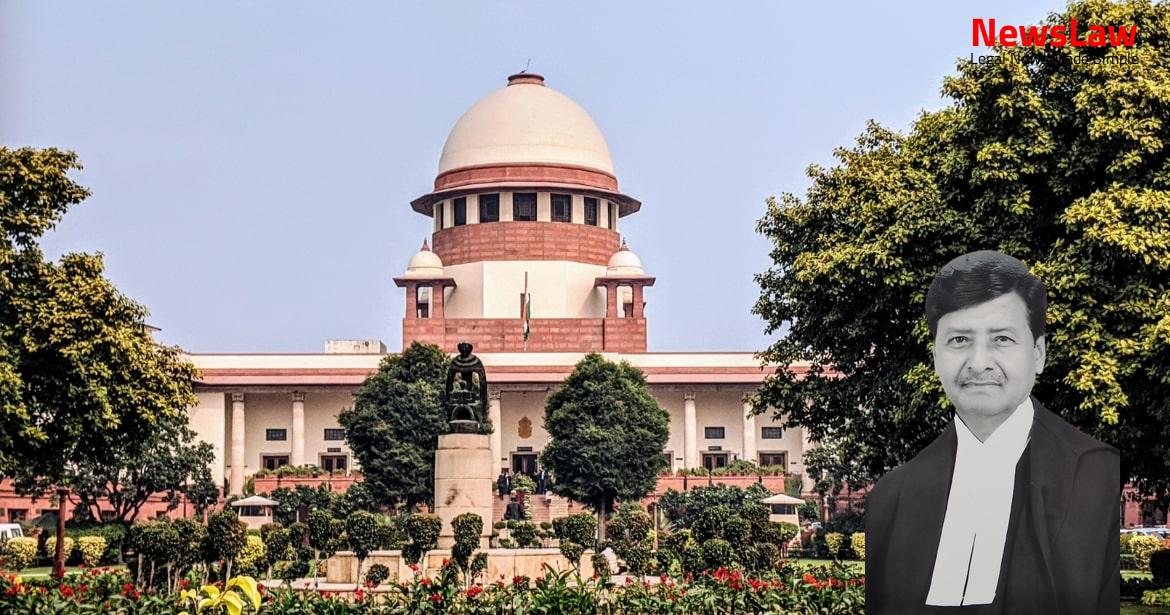The case of Dinesh Kumar v. Rajasthan Government involves a compensation dispute for the deceased employee, Dinesh Kumar. The High Court enhanced the compensation amount to Rs 8,86,120, from the initial Rs 4,33,060, impacting employee rights significantly. Stay tuned for more details on this crucial legal ruling.
Facts
- Appellants are family members of Dinesh Kumar, who died in an accident in 2008.
- The accident occurred on NH 12 in Kota, Rajasthan, involving a truck and the trailer driven by the deceased.
- The claim for compensation was allowed in 2014 for a total of Rs 4,33,060.
- The Commissioner used a multiplicand of 215.28 based on the deceased’s age to calculate the compensation amount.
- An additional amount of Rs 2,500 was added for funeral expenses.
- The Deputy Commissioner initially proceeded ex parte in the case.
- The appellants appealed for enhancement of compensation to the Madras High Court.
- The High Court remanded the proceedings and appointed an amicus curiae.
- Despite the notification under Section 4(1B) of the 1923 Act, limiting monthly wages to Rs 4,000, the Commissioner maintained the compensation amount at Rs 4,33,060.
- The Commissioner’s decision was based on the notification’s interpretation of a cap on monthly wages for calculating compensation.
- The High Court noted that the appellants filed a salary certificate as Exhibit P5 to establish the monthly income of the deceased was Rs 32,000.
- No witness was examined on behalf of the employer to prove the salary certificate.
- The High Court awarded interest at the rate of 12% per annum from the date of the accident.
- The relevant factor specified in Schedule IV for the deceased, who was 26 years old on the date of the accident, resulted in a multiplicand of 215.28.
- The appellant’s representative argued that the Commissioner adopted Rs 4,000 per month, and the High Court Rs 8,000 per month as errors in calculation.
- Enhanced income of Rs 8,000 per month was considered by the High Court as the basis for computation due to the nature of the social welfare legislation involved.
- The Deputy Commissioner’s decision to award Rs 4,33,060 as compensation was enhanced by the High Court to Rs 8,86,120 under the Employee’s Compensation Act 1923.
- The compensation payable in case of an employee’s death resulting from injury is fifty per cent of the monthly wages multiplied by the relevant factor as per Section 4(1)(a) of the Act.
- The proof of the deceased employee’s salary being Rs 32,000 per month led to the adjustment of the compensation amount by the High Court to Rs 8,86,120.
- A notification was issued by the Central Government in May 2010 regarding the specified amount for compensation calculations.
- The High Court, in favor of justice, remanded the proceedings to allow the examination of the employer’s witness in support of Exhibit P5.
Also Read: Interpretation of Parliamentary Privileges: Immunity from Prosecution for Bribery
Issue
- The main issue before the Court is the application of Act 45 of 2009 to accidents that occurred before its enforcement on 18 January 2010.
- The specific question is whether the benefit of Act 45 of 2009, which removed the provision capping monthly wages at Rs 4,000, applies to pending cases of accidents that happened before the Act came into force.
Also Read: Legal Analysis on Arbitration Petition Limitation Period
Arguments
- Amicus curiae sought to distinguish the judgments in Pratap Narain Singh Deo v Srinivas Sabata and Kerala State Electricity Board v Valsala.
- It was argued that the relevant date for determining compensation under the 1923 Act is the date of the accident.
- Reference was made to Act 45 of 2009 which deleted the deeming provision in Explanation II to Section 4.
- The method of calculating wages is specified in Section 5.
Also Read: Analysis of High Courts’ Jurisdiction and Court Orders Under Article 142
Analysis
- Section 19 of the Act states that any question in a proceeding under the Act shall be settled by the Commissioner in the absence of an agreement.
- Sub-section (2) of Section 19 requires the employer to make a provisional payment based on accepted liability by depositing it with the Commissioner or paying it directly to the employee.
- Section 5(a) is applicable in cases where the employee was in the service of the employer for a continuous period of not less than twelve months immediately preceding the accident.
- Section 4A(3) allows the Commissioner to direct the payment of interest and an additional amount as arrears if the employer defaults in paying compensation within one month from the due date.
- Section 4A(2) covers situations where the employer accepts the liability to pay compensation but disputes the amount payable by the injured employee.
- In Pratap Narain Singh, the Court held that the benefit of an amendment increasing compensation would apply to accidents that occurred prior to the coming into force of the amendment.
- However, a subsequent Bench overruled this decision and stated that the amendment benefit would not apply to accidents that took place before its enforcement date.
- The Court differentiated between the 1923 Act and the 1989 Act concerning the retrospective application of amendments enhancing compensation.
- The reasoning behind extending the benefit of amendments to pre-amendment accidents is to balance the burden on employers with the benefit to employees.
- The judgments in Rathi Menon and Alavi also support extending amendment benefits to accidents occurring before the amendment’s enforcement date.
- The recent trend in judgments, like Rina Devi and Radha Yadav, aligns the determination of compensation with the date of the accident under the 1989 Act.
- The scheme for block assessment in Chapter XIV-B of the Finance Act aimed at simplifying tax assessments in search cases and preventing tax evasion.
- The relevant date for determining compensation payable is the date of the accident, not the date of final adjudication or settlement.
- Act 45 of 2009 does not apply retrospectively to accidents that occurred before its enactment.
- Employers are obligated to make a provisional payment to the Commissioner or employee if there is a dispute regarding the quantum of compensation payable.
- The amendments to the 1923 Act aim to streamline the compensation process and enhance the amount of compensation payable to employees.
- Prior to Act 45 of 2009, Section 4 contained Explanation II, which was deleted by the enactment, leading to changes in the interpretation of compensation due dates.
- No appeal was filed by the respondents against the High Court’s judgment increasing the compensation.
- The Court decided not to interfere with the compensation ordered by the High Court.
- The decision was made in line with the inherent jurisdiction of the Court to do complete justice under Article 142 of the Constitution.
Decision
- The appeal has been dismissed after clarifying the law as noted above.
- Compensation of Rs 8,86,120 has been quantified, with 12% interest payable from the date of the accident.
- Compensation must be paid to the first and second appellants jointly and severally by the respondents.
- The liability for the payment of compensation is joint and several.
- No costs have been ordered.
- Service has been completed on the respondents as per office reports.
Case Title: K.SIVARAMAN Vs. P.SATHISHKUMAR (2020 INSC 180)
Case Number: C.A. No.-009046-009046 / 2019



